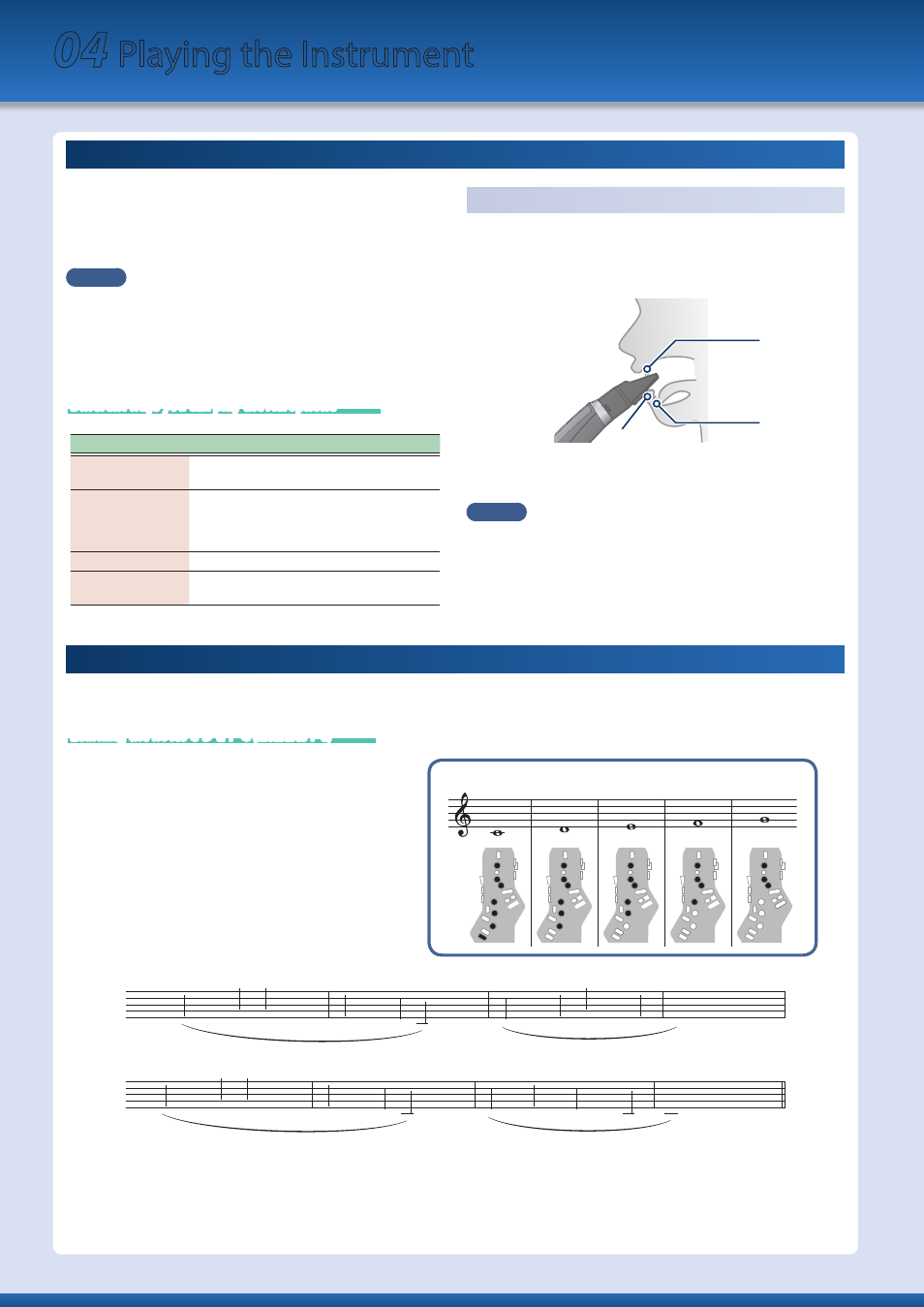Playing the instrument, How to make sound, Playing songs – Roland Aerophone AE-20 Digital Wind Instrument User Manual
Page 10: 44 .ï jп ъ, Ï jп ъ, Ï jп .п jп, П п .п jп, П п ъ, П п п п, Ï jп п п

04
Playing the Instrument
How to Make Sound
Hold the mouthpiece lightly in your mouth and blow into it.
Blowing harder produces a louder sound, and blowing softer
produces a softer sound. Biting down hard on the mouthpiece
raises the pitch, and loosening your bite lowers the pitch.
MEMO
¹
Your mouth may get tired and air or saliva may tend to
leak out of your mouth more easily after you play the
instrument for a while, until you get used to playing. Be
sure to take a break every so often.
¹
The Aerophone makes sound without the reed vibrating.
Different ways you can play the Aerophone
Operation
Effect
Breath strength
(speed)
Volume or strength of sound
Tonguing (how your
tongue is applied)/
legato (the way you
breathe)
How quickly the sound rises (the difference
between saying “too” or “whoo”)
Speed of attack and release
Bite strength
Pitch, tonal brightness, vibrato depth
Performance keys/
octave keys
Scale/octave
Embouchure
Touch the mouthpiece with your upper front teeth at a point
about 1 cm from the tip. Let the back of your lower lip touch your
lower front teeth. Close your mouth so that your breath does not
leak out of the gaps between your mouth and the mouthpiece.
tongue
upper teeth
lower teeth
lower lip
* Putting the mouthpiece further into your mouth causes the bite
effect (bite control) to be less responsive.
MEMO
The mouthpiece is a type of controller, and you use the speed
of your breathing, the strength of your bite and your tonguing
when playing the AE-20.
Playing Songs
From Dvorak’s “New World” Symphony, Op. 95, No. 9 in E minor, 2nd movement
Learning the notes C-D-E-F-G
(measures 1–8)
G4
C4
D4
E4
F4
¹
Play in a style that matches the relaxed mood of the
music.
¹
Being aware of the long slurred phrases, play without
interruptions in the sound. Take deep breaths.
¹
Move the keys quickly even when playing slower
songs. Moving the keys in a sluggish way may cause
unintended notes to play.
¹
Try playing this with an oboe tone (P05 Woodwinds).
& 44 .Ï
jП ъ
E
G
G
.Ï
jП ъ
E
D
C
.Ï
jП .П jП
D
E
G
E
w
D
& .Ï
jП ъ
E
G
G
.Ï
jП ъ
E
D
C
П П
.П
jП
D
E
D
C
w
C
& .Ï
JП ъ
A
C
C
П П ъ
B
G
A
П П П П
A
C
B
G
w
A
& .Ï
JП ъ
A
C
C
П П ъ
B
G
A
П П П П
A
C
B
G
w
A
& .Ï
jП ъ
E
G
G
П П ъ
E
D
C
.Ï
jП .П jП
D
E
G
E
w
D
& .Ï
jП ъ
E
G
G
.Ï
JП
ъ
C
D
E
.Ï
JП
П П
D
C
D
A
w
C
& .ъ
П
D
C
ъ
ъ
D
A
w
C
w
Dvorak
"From the New World" 2nd mov
& 44 .Ï
jП ъ
E
G
G
.Ï
jП ъ
E
D
C
.Ï
jП .П jП
D
E
G
E
w
D
& .Ï
jП ъ
E
G
G
.Ï
jП ъ
E
D
C
П П
.П
jП
D
E
D
C
w
C
& .Ï
JП ъ
A
C
C
П П ъ
B
G
A
П П П П
A
C
B
G
w
A
& .Ï
JП ъ
A
C
C
П П ъ
B
G
A
П П П П
A
C
B
G
w
A
& .Ï
jП ъ
E
G
G
П П ъ
E
D
C
.Ï
jП .П jП
D
E
G
E
w
D
& .Ï
jП ъ
E
G
G
.Ï
JП
ъ
C
D
E
.Ï
JП
П П
D
C
D
A
w
C
& .ъ
П
D
C
ъ
ъ
D
A
w
C
w
Dvorak
"From the New World" 2nd mov
10